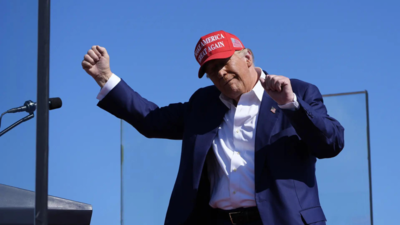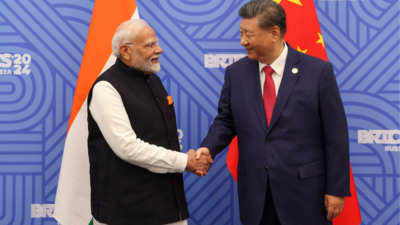
A potential Donald Trump victory and economic troubles at home have prompted China to embark on a charm offensive, particularly with US allies and partners.
From proclaiming a desired “fresh start” with Japan to a detente with India, Chinese officials have sought to dial down diplomatic friction days ahead of the US presidential election. Beijing has also signaled its intent to improve ties with the UK and Australia, a seeming departure from the kind of combative diplomacy it became famous for during Trump’s first term.
The diplomatic overtures underscore changing political calculations by Beijing — and its counterparts — in anticipation of a possible return of an unpredictable US president. They may help China buffer against economic turbulence from a man who has vowed to impose tariffs at levels that would decimate commerce between the top powers and levied trade threats even at his country’s allies.
“China has been unusually solicitous in trying to settle or improve relations with numerous countries over the last month,” said Richard McGregor, senior fellow for East Asia at the Lowy Institute think tank in Sydney. “Beijing is looking for friends and partners amidst any Trumpian chaos.”
Illustrating this shift, China reached a breakthrough with India on Monday with an agreement to resume patrolling operations over the disputed Himalayan border. The deal ended a four-year standoff with India and raised the prospect for the South Asian nation to eventually ease punitive measures on Chinese businesses.
Two days later, President Xi Jinping and Prime Minister Narendra Modi held their first formal meeting since 2022 on the sidelines of the BRICS summit of emerging economies in Russia, where the leaders pledged to stabilize relations.
“The two sides should strengthen communication and cooperation, properly manage differences and disagreements,” Xi was quoted as saying by Chinese state broadcaster CCTV.
The detente also reflects other nations’ efforts to adjust to a world of rising trade barriers. A willingness among developing nations to shore up ties with China is driven in part by their own desire to hedge against increasingly protectionist American policy, according to Henry Wang Huiyao, founder of the Center for China and Globalization research group in Beijing.
“There is a push-and-pull effect. The US scapegoating other nations is pushing countries away,” he said, referring to Trump’s threats of across-the-board tariffs on both US allies and adversaries after blaming them for the US’ domestic economic woes.
Latest polls show the presidential contest between Trump and Democratic candidate Kamala Harris could hardly be tighter, with razor-thin margins in each of the seven swing states.
China’s trade relationships will face further scrutiny at a series of global forums hosted in Latin America days after the US election next month, including the Asia-Pacific Economic Cooperation and Group of 20 summits.
Improved ties have already paid off for some of China’s trade partners. Australia’s wine exports jumped by more than a third this year, boosted by an increase in shipments to the Asian nation after the countries ended a spat over Canberra’s support for a probe of Covid’s origins.
Japan’s seafood exports could be the next beneficiary. After banning those products and protesting Tokyo’s discharge of treated wastewater from a crippled nuclear power plant, Beijing last month reached a deal with Tokyo that would pave the way for a lifting of the restrictions.
Any improved ties may help China offset the prospect of worsening tensions with the US and European Union, which voted earlier this month to impose tariffs as high as 45% on electric vehicles from China. In response, Beijing is pressuring Chinese automakers to pause expansion in the EU, Bloomberg previously reported.
US-China ties, too, have stabilized over the past year, even as major divisions persist over issues including Taiwan, the South China Sea and President Joe Biden’s export controls on advanced chips and other technology.
US National Security Adviser Jake Sullivan, who has had many hours of high-level meetings with his Chinese counterparts this year, in August said China recognizes that elections and transitions are “sensitive periods” and seeks to manage ties responsibly.
Beijing has been the main driver of the diplomatic push, said Yun Sun, director of the China program at the Stimson Center in Washington, who called it a “charm offensive.”
In China, Beijing’s push to repair longstanding diplomatic feuds has raised expectations for a favorable response in return. Guancha.cn, a nationalist news website, took note of warming ties with Australia in a recent commentary and said Canberra hasn’t imposed any tariffs on Chinese electric vehicles out of national security concerns, unlike the US and EU.
Still, these warming ties are unlikely to translate into long-term shifts on core issues. China has maintained a tough stance on its claims on Taiwan and South China Sea even as it seeks to calm trade tensions.
Improved trade relations haven’t shifted Australia’s fundamental security priorities either. The country’s defense industry minister on Tuesday announced a $4.7 billion deal to acquire US precision missiles, warning of “the greatest arms race” in the region since 1945.
In India, officials said suspicion of China remains deep and it’s unclear how far it’d loosen rules for Chinese investment. They also said the move to improve ties is aimed at strengthening India’s economy over the long haul rather than making a strategic shift to turn its back on the US-backed Quad, which also includes Japan and Australia.
Nevertheless, improved ties with its neighbors will give China more freedom of action and options, said Ja Ian Chong, an associate professor of political science at the National University of Singapore. It comes as China’s economy grew at its slowest pace since early 2023 and Beijing seeks to revive growth with a forceful policy package.
“Given its domestic economic challenges and a desire to woo foreign investment, it is unsurprising that Beijing is trying to smooth over ties with key neighbors who happen to be important economic partners,” Chong said.






